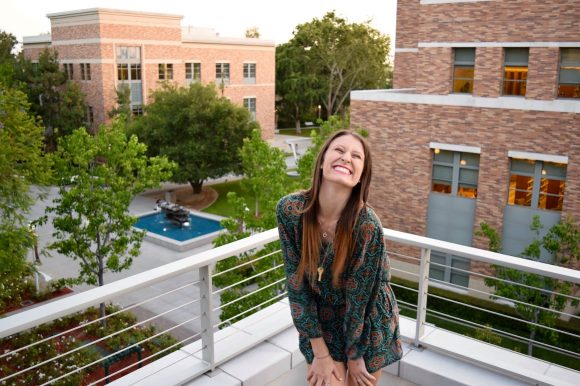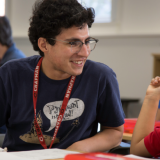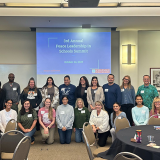From IES to the Classroom – Samantha Barnes ’17
December 4, 2017

Samantha Barnes ’17 is currently pursuing a career in education through the Teach for America program. She is placed as a kindergarten teacher in Nashville, Tennessee, and has a classroom full of 20 five and six year olds, whom she adores. Samantha spoke with the Attallah College Undergraduate Student Newsletter about her exciting new job, with advice for Attallah students.
How did the Integrated Educational Studies program prepare you for your current career?
Oh my gosh, IES prepared me so well for this position. The intentional focus IES classes have on social justice, inequity, and bridging the gap within education is very unique, and it helped me know how to serve my students, who fall at the poverty line and are facing inequity. I have such a greater understanding of the importance of serving the whole child, not just the educational and academia facets of a student. IES built my foundation of knowledge of how to advocate for my students appropriately when I haven’t necessarily walked their life experience.
What advice do you have for future Integrated Educational Studies graduates?
There is so much I wish I could share, but the thing that sticks out in my mind the most is hold onto your passion. Hold on to that strong conviction that drew you to education. Just within my sliver of a time as a teacher, I already know this is the toughest job I will ever love, but there are people in the education field who will try to shut you and your ideas down. They are all over the place, and I have definitely had more ideas shut down than accepted already. It’s so easy to get down on yourself and question your capabilities as an educator. Keep in mind that it’s not about them, it’s not even about you. It’s all about your kids. So hold on to that passion for your kids, even on your worst days. If you mess up one day (or multiple days) don’t worry, they’re coming back tomorrow so you can try again!
What did you find most valuable about the Integrated Educational Studies program?
All the opportunities IES provides for fieldwork and observation helped me immensely. Planning as an educator now, especially as a first-year teacher, I reflect on my fieldwork observations to remember what I saw worked or didn’t work. I reflect on them to gain perspective and new ideas that I can use in my own classroom or suggest to another teacher. Also, the fact that these observations and fieldwork occur at different types of schools gives great insight on how one school functions in comparison to another and how that affects the students. That was really helpful to me when I was applying for a teaching position and deciding where I wanted to teach. It gives you an expectation about which environment you want to contribute to and support.
If you could go back in time, what would you tell your pre-graduate self?
The biggest thing I would tell myself is I’ll never be the “perfect teacher,” because there is no such thing. After graduation I was hung up on being the perfect teacher for my students, being “ahead of the game” — by the way, there is no such thing — knowing the answers to every question, etc. Honestly, that made everything 10 times harder. I would tell my pre-graduate self this: “You will forget things, but people will give you grace because they’ve been there too. There will be a lot you don’t know, and I mean a lot, but that’s okay because someone, somewhere in your school or district will have an answer and be willing to share. After all, you don’t know what you don’t know, which makes asking questions hard sometimes. There will be many situations where you don’t know what to say or do, or you will make a mistake, but that is okay. Most of the time your kids will forgive you because they love you anyway. There will also be a lot you can’t fix, and it will be really infuriating. In those moments, your kids usually just need to be held and told, “I know this isn’t fair, and I am so sorry I can’t fix it. But I’m in your corner, and we can do hard things.” If you mess up one day (or multiple days), it is okay. Your students are coming back tomorrow so you can try again!
Is there anything else you want to share with future Attallah graduates?
One more thing! I have never realized the importance of self-care more in my life than since I began teaching. In a selfless career, it is way too easy to put yourself on the back burner. You get home and you have emails, lesson planning, grades, and parent calls, and you need to prepare and revise for the next day, become a coach, join a committee, etc. It’s easy to push yourself aside and say, “But it’s for the kids.” Going home to do all those tasks won’t matter if you’re not giving your kids your best self. I am learning this every single day, and I think it’s one of the most important things I learned. You might have a killer lesson plan, but if you’re too tired, not well fed, and not taking care of your mental health that plan won’t matter because it won’t be executed as intended. Your kids won’t be getting your best self and they know it. They see it. So before you serve them, you have to serve yourself. In every facet possible. It is so important!
Excerpt from the Attallah College Undergraduate Student Newsletter.

